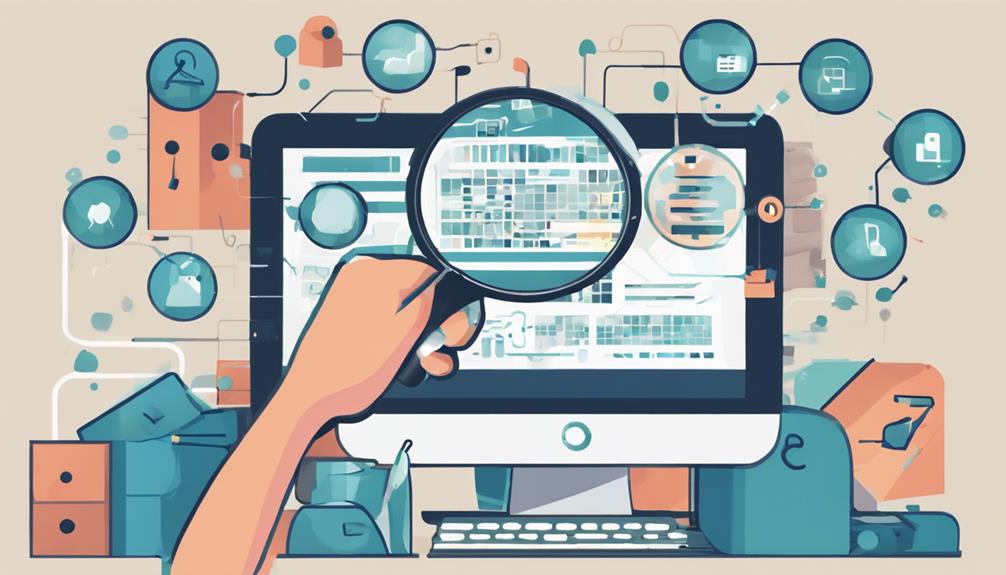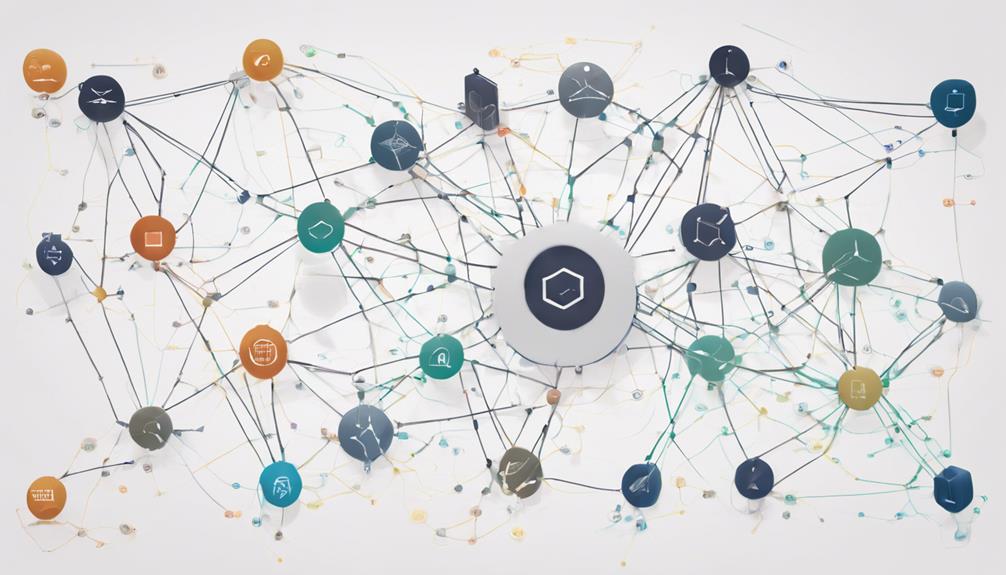When it comes to optimizing B2B data quality control, the key lies in a strategic approach that aligns with your business objectives. By establishing clear data quality goals and implementing robust validation processes, you can ensure that your data remains accurate and reliable. But that’s just the beginning. To truly excel in this domain, you need to delve into the intricacies of data quality control techniques and tools that can elevate your B2B operations to new heights of efficiency and precision.
Understand Data Quality Control Importance
To optimize B2B data quality control, it is crucial to first understand the importance of maintaining high standards in data quality. Data validation is a key aspect of this process, ensuring that the data entered into your systems is accurate, complete, and consistent. By implementing robust data validation practices, you can minimize errors and inconsistencies that may arise from incorrect or incomplete data.
Quality assurance plays a vital role in data quality control by establishing processes and procedures to monitor and maintain the quality of data throughout its lifecycle. This involves conducting regular audits, implementing data quality metrics, and ensuring compliance with industry standards and regulations. Quality assurance measures help in identifying potential issues early on, allowing for timely corrections and improvements to be made.
Set Data Quality Control Goals
Setting data quality control goals is a pivotal step in ensuring the effectiveness and efficiency of your data management processes. By establishing clear objectives, you provide a roadmap for your team to follow, ensuring that everyone is aligned towards the same outcomes. When setting these goals, it is crucial to consider metrics tracking. Define key performance indicators (KPIs) that will allow you to measure the success of your data quality control efforts accurately. These metrics could include data accuracy rates, completeness, timeliness, and consistency.
Furthermore, obtaining stakeholder buy-in is essential for the success of your data quality control goals. Engage with key stakeholders early on to ensure their understanding of the importance of data quality and secure their commitment to the set objectives. This buy-in will help foster a culture of data quality throughout the organization, making it easier to implement necessary changes and improvements. By setting specific goals and involving stakeholders from the outset, you lay a solid foundation for effective data quality control.
Develop a Data Quality Control Plan
When developing a data quality control plan, the foundational step is to outline the specific processes and procedures that will govern the management and maintenance of data integrity within your organization. Begin by establishing clear guidelines for data validation, which involves ensuring that the data collected meets the required standards and is accurate. Implementing data validation processes will help in identifying any inconsistencies or errors in the data early on, preventing issues downstream.
Additionally, incorporate data cleansing procedures into your plan. Data cleansing involves detecting and correcting any inaccuracies or inconsistencies in the data to improve its overall quality. By regularly cleansing your data, you can eliminate duplicate records, standardize formats, and remove irrelevant information, thus enhancing the reliability and effectiveness of your data.
Developing a comprehensive data quality control plan that includes both data validation and data cleansing processes will set a strong foundation for maintaining high-quality data within your organization, ultimately leading to better decision-making and improved operational efficiency.
Implement Data Quality Control Techniques
When looking to optimize B2B data quality control, implementing effective data quality control techniques is crucial for ensuring the integrity and accuracy of your data. To achieve this, consider the following key strategies:
- Data Cleansing Techniques: Utilize data cleansing methods to eliminate duplicate, incomplete, or inaccurate data entries. This process involves identifying and rectifying errors within the dataset to enhance overall quality and reliability.
- Error Detection Methods: Implement error detection mechanisms to identify anomalies or inconsistencies within the data. By regularly monitoring and analyzing data patterns, you can proactively detect and address any issues that may compromise data quality.
- Regular Audits: Conduct routine audits to assess the quality of your data and identify areas that require improvement. By regularly reviewing data quality metrics and performance indicators, you can ensure that your data remains accurate, consistent, and up to date.
Use Data Quality Control Tools
When selecting data quality control tools, consider factors like the specific needs of your business, the scalability of the tool, and the ease of implementation. Integrating these tools seamlessly with existing systems is crucial to ensure a smooth flow of data and minimize disruptions. Monitoring data consistency with these tools allows for proactive identification and resolution of any anomalies, maintaining the overall quality of your B2B data.
Tool Selection Considerations
To effectively address the aspect of “Tool Selection Considerations” in the realm of B2B data quality control, it is crucial to meticulously evaluate various tools that cater to the specific needs and requirements of your organization. When selecting data quality control tools, here are some key considerations to keep in mind:
- Tool Evaluation: Begin by conducting a thorough assessment of the tools available in the market. Look for tools that offer robust features for data validation and quality control.
- Data Validation: Prioritize tools that excel in data validation processes. Ensure that the tools have capabilities for identifying and rectifying errors, ensuring the accuracy and reliability of your data.
- Scalability and Integration: Consider the scalability of the tools and their compatibility with your existing systems. Opt for tools that can seamlessly integrate with your B2B systems to streamline data quality control processes.
Integration With Systems
Considering the importance of seamless integration within B2B systems for effective data quality control, the utilization of appropriate data quality control tools becomes a pivotal factor in ensuring the accuracy and reliability of your organization’s data. System compatibility is crucial when selecting tools to integrate with existing systems, as it ensures smooth operations without disruptions. Data integration plays a significant role in streamlining processes and enhancing efficiency within your organization. By using data quality control tools that seamlessly integrate with your systems, you can maintain data accuracy across various platforms, leading to better decision-making and improved overall performance. These tools enable you to monitor and manage data quality in real-time, identifying and rectifying issues promptly to prevent data inaccuracies from impacting your operations. Ensuring a harmonious integration of data quality control tools with your systems is key to maximizing the effectiveness of your B2B data quality control efforts.
Monitoring Data Consistency
For effective monitoring of data consistency within your B2B systems, utilizing data quality control tools is essential. These tools help ensure data accuracy and maintain consistency checks across your databases. Here are three key benefits of incorporating data quality control tools into your monitoring process:
- Enhanced Data Accuracy: By implementing data quality control tools, you can significantly improve the accuracy of your data. These tools can automatically identify and rectify errors, ensuring that your information remains reliable and up-to-date.
- Real-Time Consistency Checks: Data quality control tools enable real-time consistency checks, allowing you to instantly spot any discrepancies or inconsistencies in your data. This proactive approach helps you address issues promptly, preventing data inaccuracies from impacting your business operations.
- Streamlined Data Management: With the aid of data quality control tools, you can streamline your data management processes. These tools can automate tasks such as data cleansing and normalization, making it easier to maintain consistent and accurate data throughout your systems. By leveraging these tools, you can optimize your data quality control efforts and enhance the overall efficiency of your B2B operations.
Monitor Data Quality Control Regularly
To ensure optimal data quality control in your B2B operations, it is crucial to implement scheduled quality checks and continuously monitor your data systems. By setting up regular quality checks, you can identify and address any discrepancies or errors promptly. Utilizing monitoring systems that provide real-time updates allows you to maintain the accuracy and reliability of your data over time.
Scheduled Quality Checks
Regularly scheduled quality checks are a critical component of maintaining high standards in B2B data quality control. To ensure the accuracy and reliability of your data, it is imperative to conduct routine assessments through scheduled quality checks. Here are three key reasons why these checks are essential:
- Audit processes: Regular quality checks allow you to audit your data processes systematically. By reviewing the procedures in place, you can identify any gaps or inefficiencies that may be affecting data quality.
- Automated checks: Implementing automated checks can streamline the quality control process. Automated tools can help detect errors, inconsistencies, or missing information in your data sets, allowing for prompt corrective actions.
- Consistent monitoring: Scheduled quality checks promote consistent monitoring of data quality over time. By establishing a regular cadence for these evaluations, you can proactively address any issues that arise and maintain high-quality data standards within your B2B operations.
Continuous Monitoring Systems
Maintaining high standards in B2B data quality control necessitates the implementation of Continuous Monitoring Systems. These systems enable real-time monitoring of data quality through automated alerts, ensuring immediate attention to any issues that may arise. By continuously validating data and detecting anomalies as they occur, businesses can proactively address discrepancies and maintain the integrity of their data.
Real-time monitoring allows for quick identification of any deviations from set quality standards, providing the opportunity to rectify errors promptly. Automated alerts play a crucial role in notifying relevant stakeholders about potential data quality issues, enabling timely intervention to prevent any negative impacts on business operations.
Furthermore, the incorporation of data validation processes within Continuous Monitoring Systems ensures that all data entering the system meets predefined quality criteria. Anomaly detection capabilities help in spotting irregularities or inconsistencies in the data, allowing for swift corrective actions to uphold data accuracy and reliability. Implementing Continuous Monitoring Systems is essential for businesses looking to uphold impeccable B2B data quality control standards.
Frequently Asked Questions
How Can Data Quality Control Impact Overall Business Revenue?
Improving data quality control directly impacts revenue by ensuring accurate, reliable information for decision-making. Quality improvement enhances operational efficiency, customer satisfaction, and strategic planning. Optimal data quality drives business growth and profitability.
What Are the Common Challenges Faced in Data Quality Control?
In data quality control, common challenges include data validation and error detection. You must consistently monitor and address inaccuracies to ensure reliable information. Implementing automated tools and regular audits can help mitigate these issues effectively.
How Do You Ensure Data Quality Control Compliance With Regulations?
To ensure compliance with regulations in data quality control, you must prioritize regulatory requirements and data validation practices. Conduct compliance audits regularly to verify data accuracy and alignment with legal standards. Stay vigilant to uphold data integrity.
Are There Specific Industries That Benefit Most From Data Quality Control?
In healthcare and finance, stringent data quality control is crucial for regulatory compliance and patient confidentiality. Similarly, manufacturing and retail sectors benefit from accurate data for inventory management and customer insights, enhancing operational efficiency and decision-making processes.
What Are the Consequences of Ignoring Data Quality Control in B2B Operations?
Ignoring data quality control in B2B operations is like sailing through a storm without a compass. It jeopardizes data integrity, leading to errors, inefficiencies, and missed opportunities. Prioritizing data quality ensures smoother operations and better decision-making for optimal efficiency.



